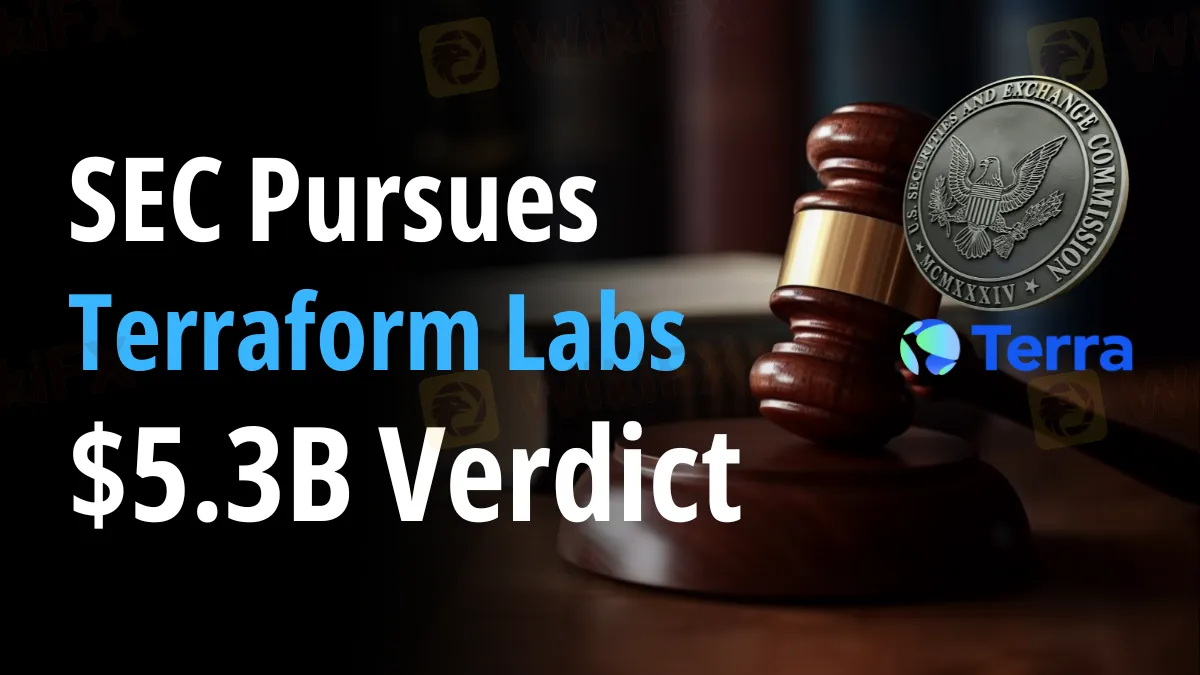简体中文
繁體中文
English
Pусский
日本語
ภาษาไทย
Tiếng Việt
Bahasa Indonesia
Español
हिन्दी
Filippiiniläinen
Français
Deutsch
Português
Türkçe
한국어
العربية
SEC Pursues Terraform Labs: $5.3B Verdict
Abstract:Learn about the SEC's pursuit of Terraform Labs, convicted of fraud in the $40B Terra ecosystem collapse. The $5.3B verdict sets a precedent in cryptocurrency regulation.

The SEC has asked a New York court to award Terraform Labs co-founder Do Kwon $5.3 billion. This punishment is based on Terraform Labs' $40 billion participation in the Terra ecosystem collapse last year, which shook the cryptocurrency world.
Kwon and Terraform Labs were convicted of civil fraud this month. A Manhattan jury determined that they inflated Terra blockchain potential and misrepresented Terra USD (UST) reliability. The SEC demanded a final judgment to punish the defendants after the jury's verdict.
Kwon and Terraform Labs could face $520 million in SEC civil fines, $4.74 billion in disgorgement, and prejudgment interest. Terraform Labs would pay $420 million, and Kwon $100 million.
The SEC alleged in a detailed brief that Kwon and his firm gained over $4 billion in illicit gains, with the prospect of more. Other securities sales include $65.2 million of LUNA and $4.3 million of MIR to institutional investors and more than $4 billion through Luna Foundation Guard (LFG) and crypto trading platforms.
The SEC emphasizes that heavy penalties are necessary as a deterrent to future crimes as well as retaliation, and feels that the amount is a reasonable assessment of Kwon and his company's illegal revenues.

Furthermore, the SEC is seeking strict injunctive action against Kwon and Terraform Labs. The proposed punishments include a ban on future securities breaches and limitations on trading crypto asset securities. Furthermore, an officer-and-director ban would preclude Kwon from ever holding a senior position in an SEC-reporting public firm again.
The SEC's motion emphasizes the defendants' apparent lack of remorse and the possibility of future breaches, as stated at the trial by current Terraform Labs CEO Chris Amani. Amani's testimony highlighted Terraform's continuous product development and token sales, which the SEC cited as indicators of potential recidivism.
However, in response to the SEC's inquiries, Terraform Labs has argued for a small civil penalty for US-based breaches, referencing the company's current financial struggles and assets of about $150 million. The defense team representing Kwon argued against the SEC's request for injunctive relief, pointing to his current state of unemployment and the possibility of criminal accusations.
Kwon remains jailed in Montenegro after being arrested last year for trying to go to Dubai with false passports. Montenegrin officials are also reviewing extradition requests from the United States and South Korea, where he faces further criminal charges in connection with the Terra collapse.
This high-stakes legal battle shows the SEC's increasing will to punish wrongdoing in the new cryptocurrency business and emphasizes how unpredictable cryptocurrency operations may be. This lawsuit has the potential to set a significant precedent for the regulation and accountability of digital currency.

Disclaimer:
The views in this article only represent the author's personal views, and do not constitute investment advice on this platform. This platform does not guarantee the accuracy, completeness and timeliness of the information in the article, and will not be liable for any loss caused by the use of or reliance on the information in the article.
Read more

Why More People Are Trading Online Today?
Discover why online trading is booming with tech, AI, and a push for financial freedom. From stocks to crypto, it’s a thrilling hustle for all.

SEC Ends Crypto.com Probe, No Action Taken by Regulator
The SEC has closed its investigation into Crypto.com with no action taken. Crypto.com celebrates regulatory clarity and renewed momentum for the crypto industry.

Interactive Brokers Expands Crypto Trading with Solana, XRP, Cardano, and Dogecoin
Interactive Brokers adds Solana, XRP, Cardano, and Dogecoin to its platform, enabling U.S. and U.K. clients to trade crypto 24/7 with low fees.

Fidelity Investments Explores Stablecoin Innovation in Digital Assets Sector
Fidelity Investments tests a stablecoin, joining major financial firms in the booming crypto sector. Discover how this impacts digital payments and blockchain adoption.
WikiFX Broker
Latest News
Why Are Financial Firms Adopting Stablecoins to Enhance Services and Stability?
Experienced Forex Traders Usually Do This Before Making a Lot of Money
Octa vs XM:Face-Off: A Detailed Comparison
When High Returns Go Wrong: How a Finance Manager Lost RM364,000
Bridging Trust, Exploring Best—WikiEXPO Hong Kong 2025 Wraps Up Spectacularly
Fidelity Investments Explores Stablecoin Innovation in Digital Assets Sector
Interactive Brokers Expands Crypto Trading with Solana, XRP, Cardano, and Dogecoin
SEC Ends Crypto.com Probe, No Action Taken by Regulator
Why More People Are Trading Online Today?
Gold Surges to New Highs – Is It Time to Buy?
Currency Calculator







